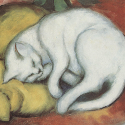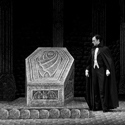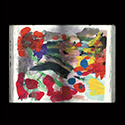What are you reading today/book club
Re: What are you reading today/book club
i think pnin is maybe the best of nabokov. havent read for 10+ years but theres whole passages i will never forget. those paragraphs with his new teeth and feeding the washing machine out of sheer scientific curiosity. the memories of his childhood girlfriend when he gets lost in the snow and the meditation on the unbearable past. the pencil sharpener that says 'ticonderoga ticonderoga', feeds on the delicious cedar wood, and ends in a soundlessly spinning void as we all must.
the shape of the narrative is so beautifully constructed, with all those circular motifs running through it: a football (+ the ideal one he sketches in the air), his head, victor's bowl.
whenever i feel like i ought to give some cyberpunk a try i manage 2 paragraphs of 'his parents were TwenCen relics who never had him optimized' and think nah fuck this, i'm going to read something good instead.
the shape of the narrative is so beautifully constructed, with all those circular motifs running through it: a football (+ the ideal one he sketches in the air), his head, victor's bowl.
whenever i feel like i ought to give some cyberpunk a try i manage 2 paragraphs of 'his parents were TwenCen relics who never had him optimized' and think nah fuck this, i'm going to read something good instead.
- 3
-

pirxthepilot - Posts: 507
- Joined: Wed Jul 23, 2014 7:26 am
- Reputation: 2022
Re: What are you reading today/book club
Generally agree on the cyberpunk fiction front. It's no longer necessary and the dirty future fetishisation is fun but most fetishes aren't really as fun once they're in a Disney film.
That said I bought some issues of http://www.aft3r.us/ and I've been enjoying having it around, though it's more like good old science fiction than cyberpunk.
That said I bought some issues of http://www.aft3r.us/ and I've been enjoying having it around, though it's more like good old science fiction than cyberpunk.
- 0

-

bels - Yung Winona
- Posts: 5087
- Joined: Thu Jul 11, 2013 2:43 pm
- Reputation: 18872
Re: What are you reading today/book club
Mad thanks to ! Thank you so much for sending a copy!


- 3
"Let's be vagabonds." - Yohji Yamamoto
-

rjbman - Posts: 1560
- Joined: Sun Sep 29, 2013 11:34 pm
- Location: CO
- Reputation: 6846
Re: What are you reading today/book club
Just got finished with My Mother's House & Sido by Colette. Its kind of just a collection of short stories about her mother/childhood home. I usually hate these kind of books, since they can be kind of self-indulgent and boring (looking at you Sartre, you turd). This one was actually pretty cool though, since Colette's mom seemed like a really interesting woman. Lots of scenes of Colette's mom in the garden, yelling at her children. Recommend.
Currently reading a collection of Lovecraft stories in 'the Cthulhu mythos'. Finding it really hard to get through, all the stories kind of end up being: 1. weird shit goes down in some small town on the east coast 2. Cthulhu probably trying to invade earth somehow 3. Some anthropologist reads about it in some survivor's journal years after the fact.
Lovecraft's high-key racist tendencies are also pretty jarring. Cthulhu seems to associate pretty heavy with people of 'degenerate races' (read: non-white), who are always kind of lurking on the outskirts of the stories, doing weird cult-stuff. Pretty interesting how it fits in with the fear of the unknown narrative that Lovecraft was so into. Really good illustration of a fear-based racist mindset.
Currently reading a collection of Lovecraft stories in 'the Cthulhu mythos'. Finding it really hard to get through, all the stories kind of end up being: 1. weird shit goes down in some small town on the east coast 2. Cthulhu probably trying to invade earth somehow 3. Some anthropologist reads about it in some survivor's journal years after the fact.
Lovecraft's high-key racist tendencies are also pretty jarring. Cthulhu seems to associate pretty heavy with people of 'degenerate races' (read: non-white), who are always kind of lurking on the outskirts of the stories, doing weird cult-stuff. Pretty interesting how it fits in with the fear of the unknown narrative that Lovecraft was so into. Really good illustration of a fear-based racist mindset.
- 2
-

fen - Posts: 7
- Joined: Wed Feb 01, 2017 1:19 pm
- Reputation: 24
Re: What are you reading today/book club
Recently finished Jonathan Strange & Mr Norrell on the suggestion of : I enjoyed it well enough, but don't know that I would re-read it.
Also just finished Too Like the Lightning - this has been getting a lot of buzz lately in scifi circles. It aims really high, sort of a future where Enlightenment ideals have actually been brought into law. No religion is allowed, with people instead using generic "sensayers" to talk through moral issues. There is also a ban on using gendered nouns, which could have been very neat a la Left Hand of Darkness or Ancillary Justice, but in actuality the author continues to use gendered pronouns. Moreso, almost all the political leaders in the book are male. Way to stomp on those gendered norms...
Next up: The Handmaid's Tale. Never read it, but unfortunately seeing a lot of references to it lately. Margaret Atwood is quite marvelous, so I have good expectations for this book.
Also just finished Too Like the Lightning - this has been getting a lot of buzz lately in scifi circles. It aims really high, sort of a future where Enlightenment ideals have actually been brought into law. No religion is allowed, with people instead using generic "sensayers" to talk through moral issues. There is also a ban on using gendered nouns, which could have been very neat a la Left Hand of Darkness or Ancillary Justice, but in actuality the author continues to use gendered pronouns. Moreso, almost all the political leaders in the book are male. Way to stomp on those gendered norms...
Next up: The Handmaid's Tale. Never read it, but unfortunately seeing a lot of references to it lately. Margaret Atwood is quite marvelous, so I have good expectations for this book.
- 2
"Let's be vagabonds." - Yohji Yamamoto
-

rjbman - Posts: 1560
- Joined: Sun Sep 29, 2013 11:34 pm
- Location: CO
- Reputation: 6846
Re: What are you reading today/book club
Just finished Ted Chiang's (the author of the story that Arrival was based off of) short story collection. About to start Invisible Planets a collection of translated Chinese sci-fi short stories. Next on the docket after that is The Idea Factory, a book about the history of Bell Labs.
- 1
- brlmski
- Posts: 267
- Joined: Tue Feb 11, 2014 3:10 pm
- Location: chaw-cago
- Reputation: 610
Re: What are you reading today/book club
For someone who hasn't been actively reading books for leisure since around 2010 when he realized that the internet provides instant entertainment, how do you guys suggest i ween myself back into reading? I've still been buying books just they kinda sit there. Magazines are different ofc.
I find I start reading then think about other things while my eyes scan the pages and mentally read the words but they make no traction. Help!
I find I start reading then think about other things while my eyes scan the pages and mentally read the words but they make no traction. Help!
- 5
-

complete - Posts: 11
- Joined: Wed Dec 28, 2016 5:26 am
- Reputation: 35
Re: What are you reading today/book club
See if you can find something relevant to your other interests that can't be easily delivered in magazine or video format. Also, consider nonfiction.
- 0
“clothing for attractive rich people in their 20s to go to weddings in” — Zack Johnson on Vineyard Vines
-

adiabatic - Posts: 301
- Joined: Tue Mar 31, 2015 12:10 pm
- Reputation: 374
Re: What are you reading today/book club
Anyone here who has read Half of a Yellow Sun by Chimamanda Ngozi Adichie? I'm halfway through it and it's really captivating, although I can't really figure out if I think it's a good book or just an exciting book.
- 1
-

Indieguy - Posts: 72
- Joined: Mon Jun 02, 2014 11:07 am
- Location: Stockholm, Sweden
- Reputation: 328
Re: What are you reading today/book club
Currently working my way through Banana Yoshimoto's Amrita. I really loved Kitchen and generally every melancholy-yet-slightly-magical Japanese novel I've read, but this one feels like it got away from Yoshimoto lengthwise. I'll probably see it through to the end because the payoff with Yoshimoto is always in the form of a few quotable passages here and there.
- 1
-

wolflarsen - Posts: 49
- Joined: Fri Jan 22, 2016 12:40 pm
- Location: PHL via BOS
- Reputation: 156
Re: What are you reading today/book club
i was thinking today about herve guibert, doubt anyone has read or even heard of him? a real sadness that he died so young, and also that in his day novelists of his type, (heir to leiris, bernhard, sade, bataille) were sort of ghettoised: bodily fluids, illness, manic obsession, love affairs with street hustlers etc. as a result he seems to have slipped into obscurity.
the most ironic aspect is that he kind of 'novelized' forms/ideas he shared with friends like barthes and foucault, and effectively pioneered the confessional 'modern augustinian' tone that is like the default tone of a zillion columnists/bloggers now. also produced a great body of photographic work, self portraits, documentation of his encroaching illness/death.
honestly kids, put down your cyberpunk and read this
good article by ed white:
https://www.lrb.co.uk/v15/n21/edmund-white/love-stories
the most ironic aspect is that he kind of 'novelized' forms/ideas he shared with friends like barthes and foucault, and effectively pioneered the confessional 'modern augustinian' tone that is like the default tone of a zillion columnists/bloggers now. also produced a great body of photographic work, self portraits, documentation of his encroaching illness/death.
honestly kids, put down your cyberpunk and read this
good article by ed white:
https://www.lrb.co.uk/v15/n21/edmund-white/love-stories
- 2
-

pirxthepilot - Posts: 507
- Joined: Wed Jul 23, 2014 7:26 am
- Reputation: 2022
Re: What are you reading today/book club
Working my way through Love in the Time of Cholera by Gabriel Garcia Marquez currently. Beautiful writing, I wish I could read it in Spanish :/
Also read One Hundred Years of Solitude over the summer, and its become one of my favorites.
Vonnegut's Slapstick was a fun read as well. He's probably my favorite author, I've read a bunch of his books, really love the style and his outlook overall.
Not sure what I wanna read next, looking for something a bit different if anyone has some suggestions
Also read One Hundred Years of Solitude over the summer, and its become one of my favorites.
Vonnegut's Slapstick was a fun read as well. He's probably my favorite author, I've read a bunch of his books, really love the style and his outlook overall.
Not sure what I wanna read next, looking for something a bit different if anyone has some suggestions
- 2
-

plaidappendix - Posts: 32
- Joined: Mon Nov 03, 2014 9:59 pm
- Location: Boston
- Reputation: 142
Re: What are you reading today/book club
I'm reading the Bolaño short story collection Last Evenings on Earth. It's good and I like some of the things he does in terms of style but I don't really like how it's all mostly about other writers and artist types. Is all his shit like this?
- 1
-

thephfactor - Posts: 277
- Joined: Tue Dec 23, 2014 3:57 am
- Reputation: 977
Re: What are you reading today/book club
I've realized that in any serious literature I'm reading for enjoyment I just can't do it online. The PDFS are all so bland and repetitive with the black background on this fake white page with the dryest font. theres no feeling of flipping the page when i scroll down, there's no difference between one chapter and the next. other tabs seem to always beckon and the book barely feels real- there is no connection with the tangibility of holding an adventure in both hands. I'm going paperback or hardcover for anything that's easily accessible now.
- 4
-

Cowboy - Posts: 579
- Joined: Tue Feb 24, 2015 3:11 pm
- Location: Austin
- Reputation: 2342
Re: What are you reading today/book club
I wouldn't write off all electronic reading just yet, but reading PDFs on the computer is quite possibly the least pleasant way to read anything. You can't adjust the text size easily and it's almost always dark text on an eyeball-bleachingly white background.
Anyone know of any passably decent ePub readers for Windows?
Anyone know of any passably decent ePub readers for Windows?
- 3
“clothing for attractive rich people in their 20s to go to weddings in” — Zack Johnson on Vineyard Vines
-

adiabatic - Posts: 301
- Joined: Tue Mar 31, 2015 12:10 pm
- Reputation: 374
Re: What are you reading today/book club
I want to read something with other people. What's next on the book club agenda?
- 1
-

wolflarsen - Posts: 49
- Joined: Fri Jan 22, 2016 12:40 pm
- Location: PHL via BOS
- Reputation: 156
-

pirxthepilot - Posts: 507
- Joined: Wed Jul 23, 2014 7:26 am
- Reputation: 2022
Re: What are you reading today/book club
read shadow elite yesterday, thought it was quite good, as i dont know too much about any of her case studies especially. really like the concept of 'flex nets'. anyone else read this?
also been reading a bunch of eileen chang's stuff in translation, feel like she makes all sorts of poignant comments about human nature that strongly resonate with me.
working on capital in the 21st century now but i feel like ive kinda gotten his point already after reading the first few chapters. it's soooooo long...
also thought these fictions in the new yorker that came out recently were very good:
felt like they were both written for me in uncomfortable ways, which is exactly how i want fiction to make me feel
also been reading a bunch of eileen chang's stuff in translation, feel like she makes all sorts of poignant comments about human nature that strongly resonate with me.
working on capital in the 21st century now but i feel like ive kinda gotten his point already after reading the first few chapters. it's soooooo long...
also thought these fictions in the new yorker that came out recently were very good:
felt like they were both written for me in uncomfortable ways, which is exactly how i want fiction to make me feel
- 1
-

Ques - Posts: 685
- Joined: Mon Dec 23, 2013 8:45 pm
- Location: virginia
- Reputation: 3668
Re: What are you reading today/book club
if anyone is interested in the dutch wave and Piet Oudolf in particular then Planting a New Perspective by Noel Kingsbury is really worth picking up. I feel like 90% of gardening books are either completely technical books that you reference when and where is needed or absolutely rubbish 'journals' that are just page after page of descriptive waffle that could be captured far more effectively in photography. I feel like people writing about their gardens is like us posting fitpics, very self-indulgent and actually pretty boring? Anyway this book is actually great, it has planting plans from Oudolf and Pearson as well as seasonal timelines for some of their perennial combinations. It also has great photos and explanation of the concepts behind what they do, as well as other general thoughts/reading recommendations about horticulture and gardening.
- 5

- oucho
- Posts: 508
- Joined: Thu Mar 27, 2014 5:34 pm
- Reputation: 3714
Re: What are you reading today/book club
Just finished reading Melville's Bartleby, the Scrivener as recommended earlier by
Some scattered thoughts for those who have read it:
I couldn't help but treat Bartleby as a symbol of resistance against the economic and legal order of Wall St. (you know, capitalism and property and that) for his actively doing nothing, especially after that order seemed to have isolated him from meaningful or original communication at both jobs. The narrator, in his refined white collar-ness, seemed lost when it came to activity (relying instead on language, laws and money as agents), while Bartleby had such force and power without lifting a finger -- as a mere copyist.
Also, there's certainly something about the way the narrator phrased the questions (will you not etc. etc. instead of requesting the action), but my theorizing there sort of fell apart towards the end.
The story had a very Waiting for Godot feel to it and it seems like just about everyone finds the character/story to be a mystery. Which reminds me that what Melville or any author wanted to convey is not altogether the kernel everyone should be searching for in literature. Either way, Bartleby is kind of...scary as a character, in a way. Which made me notice my own reactions and feelings as I read. physiological responses to markings on a simulated page. Gnarly.
Some scattered thoughts for those who have read it:
I couldn't help but treat Bartleby as a symbol of resistance against the economic and legal order of Wall St. (you know, capitalism and property and that) for his actively doing nothing, especially after that order seemed to have isolated him from meaningful or original communication at both jobs. The narrator, in his refined white collar-ness, seemed lost when it came to activity (relying instead on language, laws and money as agents), while Bartleby had such force and power without lifting a finger -- as a mere copyist.
Also, there's certainly something about the way the narrator phrased the questions (will you not etc. etc. instead of requesting the action), but my theorizing there sort of fell apart towards the end.
The story had a very Waiting for Godot feel to it and it seems like just about everyone finds the character/story to be a mystery. Which reminds me that what Melville or any author wanted to convey is not altogether the kernel everyone should be searching for in literature. Either way, Bartleby is kind of...scary as a character, in a way. Which made me notice my own reactions and feelings as I read. physiological responses to markings on a simulated page. Gnarly.
- 4
-

wolflarsen - Posts: 49
- Joined: Fri Jan 22, 2016 12:40 pm
- Location: PHL via BOS
- Reputation: 156
Re: What are you reading today/book club
i'd planned to re-read this but dunno if ill have time, and since other teen intellectuals are busy reading about fucking gardening here are a few scattered thoughts.
-i guess melville was writing at what we might think of as the beginning of modern capitalism, and the way he writes about the emergent systems is incredibly visionary. theres one sequence in moby dick where i think he goes from being deep in whale blubber to imagining all the cities/houses across dark america that will be illuminated by this stuff, so from a kind of pure bataille-ian 'informe' to a james bridle-esque data map. philosophically speaking today these poles are more relevant than ever.
- linked to this as you say the narrators attempts to frame bartleby within the systems of laws, exchange, taxes. and i agree this is somehow reflected in his curious phrasing. i wonder if through his weird locutions something else is trying to emerge: an idea of greek 'agape' or brotherly love. he does seem to try to help bartleby but these attempts are thwarted by the systems that frame his world view.
- of course bartleby himself has his own strange diction: the 'prefer' he uses repeatedly makes this seem something incredibly slight, a mere whim. in contrast to the annihilating force of his refusal.
- this refusal is bodily of course, linked to beckett but i also think a lot of kafka, in particular the hunger artist and odradek. your physiological responses seem appropriate for this most bodily of writers. im sure lots has been written from a queer theory perspective -that beautiful chapter in MD where he wakes with queequeg's arm around hm etc. have you seen claire denis's 'beau travail'? an amazing film that picks up on this and explores in the most beautiful way. (and people talk about 'moonlight' as if its some kind of great film? lol).
-i guess melville was writing at what we might think of as the beginning of modern capitalism, and the way he writes about the emergent systems is incredibly visionary. theres one sequence in moby dick where i think he goes from being deep in whale blubber to imagining all the cities/houses across dark america that will be illuminated by this stuff, so from a kind of pure bataille-ian 'informe' to a james bridle-esque data map. philosophically speaking today these poles are more relevant than ever.
- linked to this as you say the narrators attempts to frame bartleby within the systems of laws, exchange, taxes. and i agree this is somehow reflected in his curious phrasing. i wonder if through his weird locutions something else is trying to emerge: an idea of greek 'agape' or brotherly love. he does seem to try to help bartleby but these attempts are thwarted by the systems that frame his world view.
- of course bartleby himself has his own strange diction: the 'prefer' he uses repeatedly makes this seem something incredibly slight, a mere whim. in contrast to the annihilating force of his refusal.
- this refusal is bodily of course, linked to beckett but i also think a lot of kafka, in particular the hunger artist and odradek. your physiological responses seem appropriate for this most bodily of writers. im sure lots has been written from a queer theory perspective -that beautiful chapter in MD where he wakes with queequeg's arm around hm etc. have you seen claire denis's 'beau travail'? an amazing film that picks up on this and explores in the most beautiful way. (and people talk about 'moonlight' as if its some kind of great film? lol).
- 2
Last edited by pirxthepilot on Thu Feb 16, 2017 11:29 am, edited 2 times in total.
-

pirxthepilot - Posts: 507
- Joined: Wed Jul 23, 2014 7:26 am
- Reputation: 2022
Re: What are you reading today/book club
I’ve read exactly one and it was quite charming.
Really like the connection to the formlessness-to-Bridle-map pipeline (had to look up Bridle; his site so awesome) and I think those concepts are definitely at play here too.
A lot of analyses attempt to connect the love of fellow man concept with the narrator's treatment of Bartleby. I like the concept of this new emergent system and opposing worldviews as a result of that system as alienating both characters from each other. As for the slightness of his diction, Bartleby definitely seems to be a victim of language – via his last job – as much as the narrator (again that brotherly love/mirror) but seems to untether himself from the dominant systems as the story goes on (trending back towards informe) until he reaches the only real/complete solution.
What you’ve noted has really had me thinking more about the concept of original/authentic vs. copies here. Language itself is already a removal from the “original” thing (Plato and whatnot). Combine that with working in a dead letter office, where communication via language literally goes to die, and a scrivener’s job, where nothing original is produced (but aren’t these legal copies still deemed authentic?!) and Bartleby's fate just makes plain old sense.
Never seen beau travail, but I just recently watched moonlight. I think the era it portrays is what makes it something significant and so the critical approach is dictated by the themes. I’m certainly interested in Melville from a queer theory pov, especially when it comes to the similar notion of queer masculinity and the body.
Really like the connection to the formlessness-to-Bridle-map pipeline (had to look up Bridle; his site so awesome) and I think those concepts are definitely at play here too.
A lot of analyses attempt to connect the love of fellow man concept with the narrator's treatment of Bartleby. I like the concept of this new emergent system and opposing worldviews as a result of that system as alienating both characters from each other. As for the slightness of his diction, Bartleby definitely seems to be a victim of language – via his last job – as much as the narrator (again that brotherly love/mirror) but seems to untether himself from the dominant systems as the story goes on (trending back towards informe) until he reaches the only real/complete solution.
What you’ve noted has really had me thinking more about the concept of original/authentic vs. copies here. Language itself is already a removal from the “original” thing (Plato and whatnot). Combine that with working in a dead letter office, where communication via language literally goes to die, and a scrivener’s job, where nothing original is produced (but aren’t these legal copies still deemed authentic?!) and Bartleby's fate just makes plain old sense.
Never seen beau travail, but I just recently watched moonlight. I think the era it portrays is what makes it something significant and so the critical approach is dictated by the themes. I’m certainly interested in Melville from a queer theory pov, especially when it comes to the similar notion of queer masculinity and the body.
- 3
-

wolflarsen - Posts: 49
- Joined: Fri Jan 22, 2016 12:40 pm
- Location: PHL via BOS
- Reputation: 156
Re: What are you reading today/book club
im not sure if i would consider melville a platonist in quite that sense- (ie embracing the theory of forms, implies a 'falling away' from the 'authentic'?). the very power of a legal/written document is its iterability- it exists to be copy-able, so you can file it wiht the authorities, notarize it, produce it in court etc. this is exactly why socrates - and to some extent plato- mistrusts writing, because it removes words from the 'guarantor' of a human presence. ironically its this very presence that is all B can assert but in a completely etiolated form: perhaps in line with what you're saying B becomes an entropic inversion of the athenian man (...) who can actively claim citizenship, property rights, opinions through his presenece/words. instead he becomes something like 'bare life' (close to the way agamben talks about status of refugees). the brilliant contradiction in the context of the story is that its not some kind of schopenhauerian passivity but is in fact an act of radical willing as powerful (and as you say scary) in its way as ahab's monomania.
- 2
Last edited by pirxthepilot on Thu Feb 16, 2017 4:13 pm, edited 2 times in total.
-

pirxthepilot - Posts: 507
- Joined: Wed Jul 23, 2014 7:26 am
- Reputation: 2022
Re: What are you reading today/book club
Oh, I also finished Bechdel's second graphic memoir, Are You My Mother? recently. It was extremely textual and metatextual for a graphic novel, in addition to having a very meta narrative. A ton of panels were just pages of psychoanalysis books with bits highlighted. It heavily quoted Donald Winnicott and Virginia Woolf, some Freud, and a bit of Lacan, It also cited a bunch of plays that her mother performed. It was definitely good, and an interesting experience. Would def recommend, but I would suggest reading it either in one sitting or over as short a time as possible, because due to the heavily meta nature of it if you put it down for a few weeks as I did before finishing, the effect will be diluted.
I do think a drawback of Bechdel's work is that it is so intensely focused on her individual experiences (a critique the character of her mother levels metatextually (or meta-metatextually?) at her work in the above book). Interesting things have happened to her, and she tells a lively story, but the extreme degree of specificity can be alienating at times. This particular book is almost literally a psychoanalyst's case-file of the author.
I do think a drawback of Bechdel's work is that it is so intensely focused on her individual experiences (a critique the character of her mother levels metatextually (or meta-metatextually?) at her work in the above book). Interesting things have happened to her, and she tells a lively story, but the extreme degree of specificity can be alienating at times. This particular book is almost literally a psychoanalyst's case-file of the author.
- 1
-

thephfactor - Posts: 277
- Joined: Tue Dec 23, 2014 3:57 am
- Reputation: 977
Re: What are you reading today/book club
Any fiction recs from 2016? I'm looking at The Mirror Thief - Martin Seay, The Vegetarian - Han Kang, and Delillo's Zero K. The Mirror Thief seems way too long. The Vegetarian looks interesting, won the Man Booker international prize. Delillo is Delillo.
- 2
-

Copeland - Posts: 262
- Joined: Sun Jan 18, 2015 9:40 pm
- Reputation: 794
Re: What are you reading today/book club
just got design as art by bruno munari, looking forward to reading this, if anyone has any other design or graphic design related books shoot them my way
- 1
-

riley - Posts: 23
- Joined: Mon Oct 05, 2015 12:39 pm
- Location: toronto
- Reputation: 105
Re: What are you reading today/book club
The comparison to Kafka is interesting because there were a few aspects of the story that reminded me of Kafka a lot, mainly the relationship between Bartleby and the narrator and the way the narrator's seemingly logical and quite extensively planned actions are always met with a completely unexpected reaction that throws him off guard but is foreseeable by the reader.
There is a bit: 'The bond of a common humanity now drew me irresistibly to gloom. A fraternal melancholy! For both I and Bartleby were sons of Adam.'
And also bits about the dehumanising nature of offices:
'It was the circumstance of being alone in a solitary office, up stairs, of a building
entirely unhallowed by humanizing domestic associations—an uncarpeted office,
doubtless, of a dusty, haggard sort of appearance;—this it must have been, which
greatly helped to enhance the irritable desperation of the hapless Colt.'
(Colt was the inventor of double entry book-keeping and wrote several books on it, he murdered Adams when Adams came to collect a debt over some textbooks he had printed for him, so this seems relevant to the whole language thing)
'Of a Sunday, Wall-street is deserted as Petra; and every night of every day it is an
emptiness. This building too, which of week-days hums with industry and life,
at nightfall echoes with sheer vacancy, and all through Sunday is forlorn'
I really like that second bit because it reminds me a lot of a time I walked part way home from a night out whilst completely sober at 5am (it's a long story). I was around tower hill/monument where there are a lot of big office buildings and it was completely surreal. Just the huge office buildings and tiny pavements with absolutely no one around and with quite a lot of really old churches squeezed into gaps. Anyway yeah this is basically what you guys already said, so just agreeing with you.
The other thing I thought was interesting was the references to ancient civilisations in ruins in relation to Bartleby:
'And
here Bartleby makes his home; sole spectator of a solitude which he has seen all
populous—a sort of innocent and transformed Marius brooding among the ruins
of Carthage!'
'But he answered not a word; like the last column of some ruined temple'
'But he seemed alone, absolutely alone in the universe.
A bit of wreck in the mid Atlantic.'
And Bartleby's tomb:
'The Egyptian character of the masonry weighed upon me with its gloom. But
a soft imprisoned turf grew under foot. The heart of the eternal pyramids, it
seemed'
Like Bartleby is some last remnant of some kind of universal ancient human civilisation? I like this because of the contrast of the ruins that remain from these old civilisations: Petra, the pyramids, greek temples, and what will be left from our civilisation will be the huge office buildings. I don't know if he is referencing Greek philosophers with this or anything because I am too busy reading about fucking gardening.
There is a bit: 'The bond of a common humanity now drew me irresistibly to gloom. A fraternal melancholy! For both I and Bartleby were sons of Adam.'
And also bits about the dehumanising nature of offices:
'It was the circumstance of being alone in a solitary office, up stairs, of a building
entirely unhallowed by humanizing domestic associations—an uncarpeted office,
doubtless, of a dusty, haggard sort of appearance;—this it must have been, which
greatly helped to enhance the irritable desperation of the hapless Colt.'
(Colt was the inventor of double entry book-keeping and wrote several books on it, he murdered Adams when Adams came to collect a debt over some textbooks he had printed for him, so this seems relevant to the whole language thing)
'Of a Sunday, Wall-street is deserted as Petra; and every night of every day it is an
emptiness. This building too, which of week-days hums with industry and life,
at nightfall echoes with sheer vacancy, and all through Sunday is forlorn'
I really like that second bit because it reminds me a lot of a time I walked part way home from a night out whilst completely sober at 5am (it's a long story). I was around tower hill/monument where there are a lot of big office buildings and it was completely surreal. Just the huge office buildings and tiny pavements with absolutely no one around and with quite a lot of really old churches squeezed into gaps. Anyway yeah this is basically what you guys already said, so just agreeing with you.
The other thing I thought was interesting was the references to ancient civilisations in ruins in relation to Bartleby:
'And
here Bartleby makes his home; sole spectator of a solitude which he has seen all
populous—a sort of innocent and transformed Marius brooding among the ruins
of Carthage!'
'But he answered not a word; like the last column of some ruined temple'
'But he seemed alone, absolutely alone in the universe.
A bit of wreck in the mid Atlantic.'
And Bartleby's tomb:
'The Egyptian character of the masonry weighed upon me with its gloom. But
a soft imprisoned turf grew under foot. The heart of the eternal pyramids, it
seemed'
Like Bartleby is some last remnant of some kind of universal ancient human civilisation? I like this because of the contrast of the ruins that remain from these old civilisations: Petra, the pyramids, greek temples, and what will be left from our civilisation will be the huge office buildings. I don't know if he is referencing Greek philosophers with this or anything because I am too busy reading about fucking gardening.
- 3

- oucho
- Posts: 508
- Joined: Thu Mar 27, 2014 5:34 pm
- Reputation: 3714
Who is online
Users browsing this forum: No registered users and 49 guests
